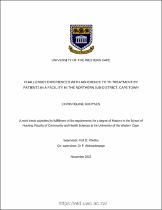Challenges experienced with adherence to TB treatment by patients in a facility in the northern sub-district, Cape Town
Abstract
Tuberculosis (TB) is an infectious disease caused by Mycobacterium tuberculosis that has existed for millennia and is considered to be the top infectious disease killer in the world with 4 400 victims daily. Poor adherence to treatment results in increased transmission rates of the tubercle bacilli, a delay in positive sputum conversion to smear-negative, morbidity and mortality, and eventually escalates the cost of the TB control programmes. Multiple reasons for poor adherence have been reported and, in some cases, interventions were implemented to combat this problem; however, this phenomenon is not abating. This implies that the current strategies might not be applicable, feasible or relevant within specific contexts.

